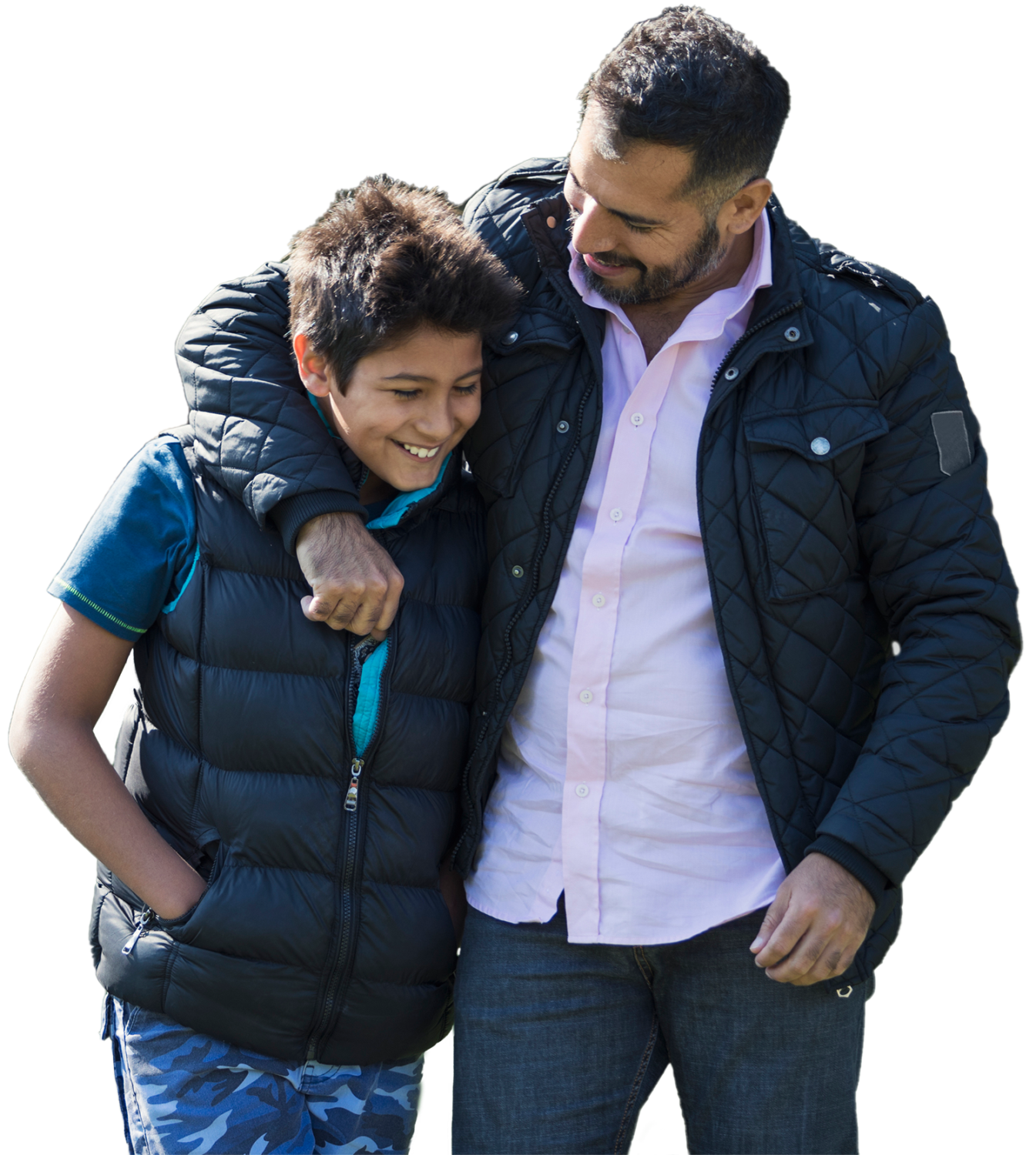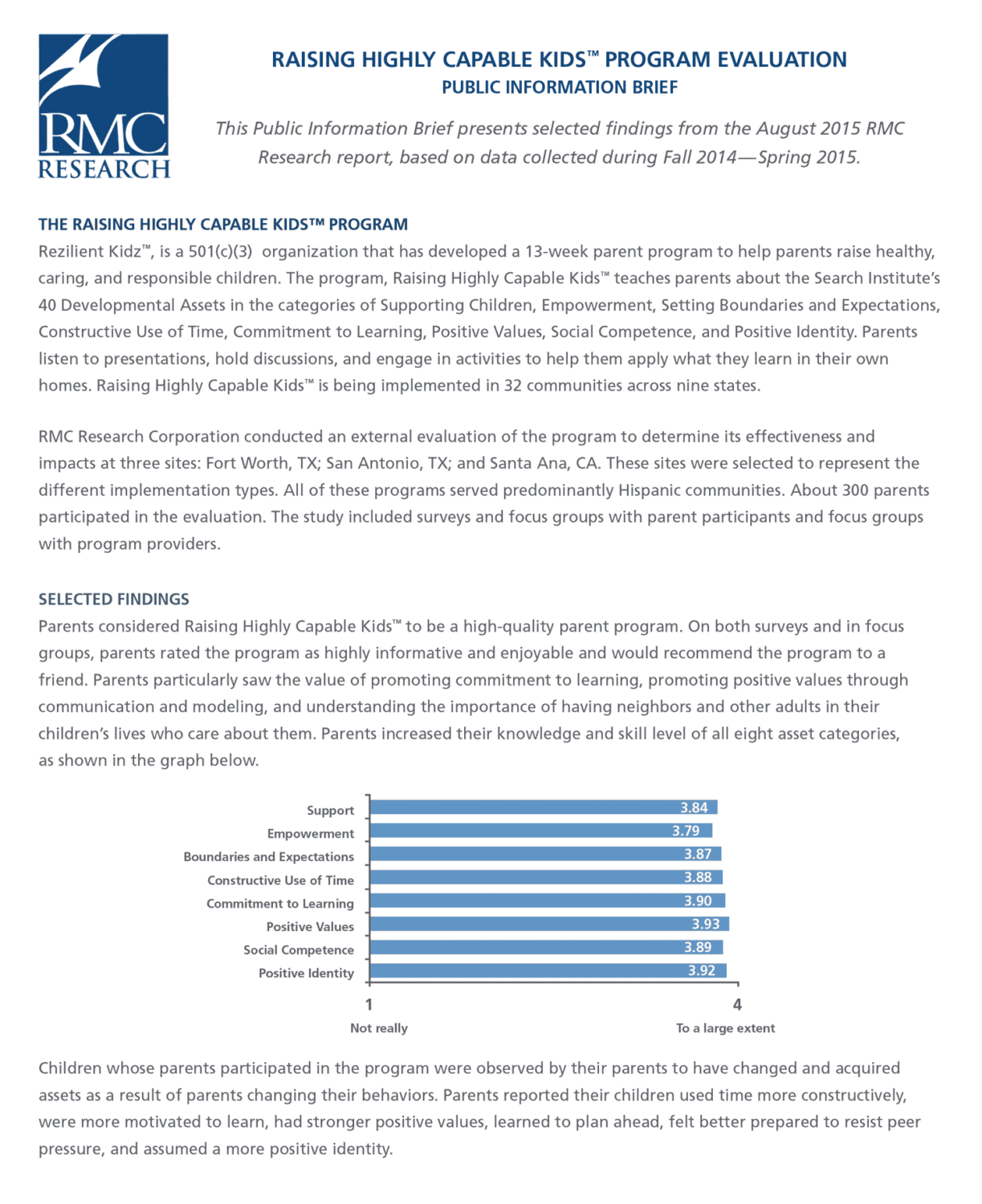Raising Highly Capable Kids
Our 13-week, multilingual, evidence-based parenting program has brought together communities to help parents raise healthy, caring and responsible children. It’s more than a curriculum. It’s a powerful community-led program with lasting results.

EMPOWERING FAMILIES
GROWING COMMUNITY
The Raising Highly Capable Kids™ program provides parents with an interactive, practical, and hands-on tool to engage and build community with other parents over the course of 13 weeks. Through relevant stories and exercises, parents will learn about Search Institute’s 40 Developmental Assets—essential building blocks that can maximize their child’s potential and empower the whole family.
Search Institute’s 40 Developmental Assets are derived from decades of research with over 5 million young people. These essential building blocks not only help parents raise healthy, caring, and responsible children but also equip kids with the power to make healthy life choices—including a proven increase in their GPA.
We’re all in this together. Transforming communities and strengthening families starts with you!
DIVING INTO
THE MATERIAL

13 WEEKLY SESSION GOALS:
1. We’re All in This Together
To encourage participants to feel comfortable talking about their parenting challenges and open their minds to new ways of helping their kids succeed.
2. What Kind of Parent Are You
To help participants consider how their histories and personalities have shaped their parenting, and how they might make the most of their strengths—and their weaknesses.
3. Stand by Me
To help participants value and seek the support of family, friends, mentors, neighbors, and schools as they raise their children.
4. Plugged In
To help group members measure how valued, useful, and safe their kids feel—and understand how to increase those levels to empower their children.
5. Limits That Liberate
To equip parents to encourage responsibility in their kids by setting clear and reasonable rules, expectations, boundaries, and consequences.
6. Yours, Mine and Hours
To help participants evaluate how their children use their time, taking steps to keep their kids’ activities as constructive as possible.
7. When the Schoolhouse Rocks
To help parents motivate their kids to learn, to care about their school, to do homework, and to read for pleasure.
8. Creating Character
To help group members choose and begin to develop in their kids three character traits from the following list: caring for others, equality and social justice, integrity, honesty, responsibility, and restraint.
9. Like Social Media, Only Better
To show parents three ways to improve their children’s empathy, friendship skills, resistance to negative peer pressure, and ability to resolve conflict.
10. Three Thumbs Up
To help each participant practice talking to his or her kids in ways that build self-esteem, purpose, and optimism about their futures.
11. What Your World Needs Now, Part 1
To help each group member identify the three Assets his or her family most urgently need to build.
12. What Your World Needs Now, Part 2
To guide each group member in making a plan to build his or her family’s three most urgently needed Assets.
13. Just the Beginning
To review the eight sets of Assets, celebrate completion of the course, and motivate parents to follow through on their Asset-building plans.

Search Institute has identified the following building blocks of healthy development that help young people grow up healthy, caring and responsible.
EXTERNAL ASSETS
SUPPORT
1. Family support—Family life provides high levels of love and support.
2. Positive family communication—Parent(s) and child communicate positively. Child feels comfortable seeking advice and counsel from parent(s).
3. Other adult relationships—Child receives support from adults other than her or his parent(s).
4. Caring neighborhood—Child experiences caring neighbors.
5. Caring school climate—Relationships with teachers and peers provide a caring, encouraging environment.
6. Parent involvement in schooling—Parent(s) are actively involved in helping the child succeed in school.
EMPOWERMENT
7. Community values youth—Child feels valued and appreciated by adults in the community.
8. Children as resources—Child is included in decisions at home and in the community.
9. Service to others—Child has opportunities to help others in the community.
10. Safety—Child feels safe at home, at school, and in his or her neighborhood.
BOUNDARIES & EXPECTATIONS
11. Family boundaries—Family has clear and consistent rules and consequences and monitors the child’s whereabouts.
12. School boundaries—School provides clear rules and consequences.
13. Neighborhood boundaries—Neighbors take responsibility for monitoring the child’s behavior.
14. Adult role models—Parent(s) and other adults in the child’s family, as well as nonfamily adults, model positive, responsible behavior.
15. Positive peer influence—Child’s closest friends model positive, responsible behavior.
16. High expectations—Parent(s) and teachers expect the child to do her or his best at school and in other activities.
CONSTRUCTIVE USE OF TIME
17. Creative activities—Child participates in music, art, drama, or creative writing two or more times per week.
18. Youth programs—Child participates two or more times per week in curricular school activities or structured community programs for children.
19. Religious community—Child attends religious programs or services one or more times per week.
20. Time at home—Child spends some time most days both in high-quality interaction with parents and doing things at home other than watching TV or playing video games.
INTERNAL ASSETS
COMMITMENT TO LEARNING
21. Achievement motivation—Child is motivated and strives to do well in school.
22. Learning engagement—Child is responsive, attentive, and actively engaged in learning at school and enjoys participating in learning activities outside of school.
23. Homework—Child usually hands in homework on time.
24. Bonding to school—Child cares about teachers and other adults at school.
25. Reading for pleasure—Child enjoys and engages in reading for fun most days of the week.
POSITIVE VALUES
26. Caring—Parent(s) tell the child it is important to help other people.
27. Equality and social justice—Parent(s) tell the child it is important to speak up for equal rights for all people.
28. Integrity—Parent(s) tell the child it is important to stand up for one’s beliefs.
29. Honesty—Parent(s) tell the child it is important to tell the truth.
30. Responsibility—Parent(s) tell the child it is important to accept personal responsibility for behavior.
31. Restraint—Parent(s) tell the child it is important to have good health habits and an understanding of healthy sexuality.
SOCIAL COMPETENCIES
32. Planning and decision making—Child thinks about decisions and is usually happy with results of her or his decisions.
33. Interpersonal competence—Child cares about and is affected by other people’s feelings, enjoys making friends, and, when frustrated or angry, tries to calm her- or himself.
34. Cultural competence—Child knows and is comfortable with people of different racial, ethnic, and cultural backgrounds and with her or his own cultural identity.
35. Resistance skills—Child can stay away from people who are likely to get her or him in trouble and are able to say no to doing wrong or dangerous things.
36. Peaceful conflict resolution—Child seeks to resolve conflict nonviolently.
POSITIVE IDENTITY
37. Personal power—Child feels he or she has some influence over things that happen in her or his life.
38. Self-esteem—Child likes and is proud to be the person that he or she is.
39. Sense of purpose—Child sometimes thinks about what life means and whether there is a purpose for her or his life.
40. Positive view of personal future—Child is optimistic about her or his personal future.
Raising Highly Capable Kids Is a Proven Evidenced-Based Program
Understanding the public and professional demand for accountability and quality of educational resources, RezilientKidz commissioned RMC Research to evaluate the efficacy of the Raising Highly Capable Kids program.
Children whose parents participated in the program were observed by their parents to have changed and acquired assets as a result of parents changing their behaviors. Parents reported their children used time more constructively, were more motivated to learn, had stronger positive values, learned to plan ahead, felt better prepared to resist peer pressure, and assumed a more positive identity.
Bring Raising Highly Capable Kids to Your Community

